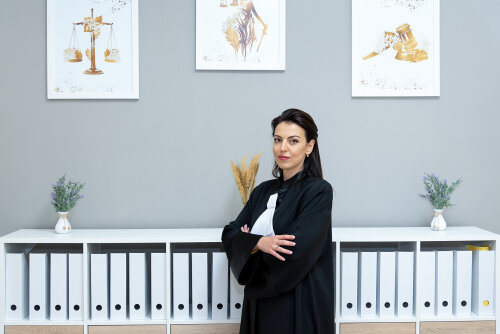Best Domestic Violence Lawyers in Sliven
Share your needs with us, get contacted by law firms.
Free. Takes 2 min.
Free Guide to Hiring a Family Lawyer
List of the best lawyers in Sliven, Bulgaria
About Domestic Violence Law in Sliven, Bulgaria
Domestic violence is a serious social and legal problem in Sliven as in the rest of Bulgaria. Victims can include spouses or partners, former partners, other family members and people who live together in close personal relationships. Bulgarian law provides both criminal and civil remedies designed to protect victims, punish perpetrators and reduce the risk of repeat harm. Local institutions in Sliven - including the police, prosecutors, courts and municipal social services - are responsible for receiving complaints, providing immediate protection and starting legal processes. Non-governmental organizations provide counselling, shelter and legal help to people who need additional support.
Why You May Need a Lawyer
Domestic violence cases often involve overlapping criminal, family and civil issues. A lawyer can help you in many common situations:
- To file a criminal complaint and to work with the prosecutor when assault, threats, stalking or sexual offences have occurred.
- To obtain protective measures from a court - for example orders that prohibit contact, require the aggressor to leave a shared home, or limit approach to specified places.
- To handle custody and visitation disputes where violence affects a child or parenting arrangements.
- To secure emergency relief and to advise on immediate safety planning, including how to document injuries and threats.
- To represent you in court hearings and to gather and present evidence - medical reports, photos, messages, witness statements and police records.
- To help access social services, shelters and available state or NGO-funded legal aid for victims.
- To advise on civil claims for damages, housing rights, divorce or property division where violence is a factor.
Local Laws Overview
Several legal frameworks are relevant to domestic violence in Sliven:
- Criminal law - Acts such as physical assault, serious bodily harm, sexual offences, threats and stalking may be criminal offences. Prosecution can lead to fines, imprisonment and criminal records for perpetrators.
- Civil protection - Bulgarian law provides procedures to obtain protection orders from courts. These measures can restrict contact, order the perpetrator to leave shared premises, and set other prohibitions aimed at preventing further harm.
- Administrative and police powers - The police can intervene to stop ongoing violence, take initial statements and refer victims to prosecutors. They can also help with emergency measures to separate the parties for immediate safety.
- Family law - Divorce, child custody and visitation decisions are handled by family courts, which will consider domestic violence as a factor when determining the best interests of the child and parental contact arrangements.
- Social protection - Municipal social services and specialist support programs offer assistance to victims and children, including temporary accommodation, psychological counselling and social work interventions.
- Legal aid - Free legal assistance may be available to eligible victims through state legal aid schemes or through NGOs. Eligibility and the scope of free help vary, so ask local authorities or NGOs about what is available in Sliven.
Frequently Asked Questions
What should I do first if I am in immediate danger?
If you are in immediate danger, call the police right away. Police are the first responders who can intervene, separate the parties and take emergency measures to protect you. If it is safe to do so, try to move to a safer place and keep any evidence of injury. Contact a trusted person, a local shelter or an NGO for support with safety planning.
Can I file a criminal complaint in Sliven about violence at home?
Yes. You can report domestic violence to the local police station in Sliven or directly to the District Prosecutor's Office. The police will take your statement and can initiate an investigation. A prosecutor decides whether to bring criminal charges based on the available evidence.
How can I get a protection order in Sliven?
To obtain a protection order you or your lawyer must apply to the court. The court can issue civil protection measures designed to prevent further violence. If a crime has been reported, the prosecutor can request protective measures as part of criminal proceedings. A lawyer experienced in domestic violence law can guide you and represent you in court.
Will the aggressor be removed from the home?
Civil protection orders and some emergency measures can require the aggressor to leave shared premises. Courts assess each case individually, taking into account safety, housing rights and the wellbeing of children. A lawyer can help present facts that support removal as part of a protection order application.
Can domestic violence affect child custody decisions?
Yes. Courts deciding custody or visitation consider the best interests and safety of the child. Evidence of domestic violence can affect custody, contact arrangements and supervised visitation. Make sure to document any incidents and provide information to the court through your lawyer.
What types of evidence help a domestic violence case?
Useful evidence includes medical reports and photos of injuries, police reports, written statements from witnesses, text messages, emails, social media messages, recordings if lawfully obtained, and a written diary of incidents. Preserve documents and take notes of dates, times and descriptions of events. Your lawyer can advise on collecting and presenting evidence legally and effectively.
Can I get free legal help in Sliven?
Free legal aid may be available to victims of domestic violence through state legal aid programs or local NGOs. Eligibility depends on income, the type of legal matter and specific program rules. Contact municipal social services, local NGOs working on domestic violence or the state legal aid office for information about available assistance in Sliven.
What should I expect from a police response?
Police should respond to reports of domestic violence, secure the scene, take your statement and refer the matter to the prosecutor if a criminal offence is suspected. They can also carry out immediate safety measures. If you are not satisfied with the police response, you can request access to the file through a lawyer and make formal complaints to supervising authorities.
How long do protection procedures take?
Timeframes vary. Emergency police actions and some temporary measures can be immediate. Court proceedings for longer-term protection orders or criminal prosecutions may take weeks or months depending on complexity and scheduling. Your lawyer can explain likely timelines and steps to obtain faster interim relief when necessary.
What if I am accused of domestic violence?
If you are accused, seek legal advice promptly. Criminal charges and civil protection orders can have serious consequences for freedom, finances and parental rights. A lawyer can explain the charges, advise on evidence preservation, represent you in hearings and help negotiate appropriate procedural steps.
Additional Resources
When dealing with domestic violence in Sliven consider these types of local and national resources:
- Local police station and emergency services for immediate protection.
- District Prosecutor's Office and District Court in Sliven for criminal filings and protection orders.
- Municipal social services in Sliven for social work support, temporary accommodation and child protection services.
- Non-governmental organizations that support victims of domestic violence - look for local branches or national NGOs that operate in Bulgaria and in the Sliven region for counselling, shelter and legal help.
- State legal aid providers and bar associations for information about free or low-cost legal assistance.
- Psychological and medical services - local clinics and hospitals can document injuries and provide care and expert reports for legal processes.
Next Steps
If you or someone you know needs legal assistance in Sliven, consider the following steps:
- If you are in immediate danger - contact the police without delay.
- Preserve evidence - document injuries, messages and incidents, and keep copies of records and reports.
- Contact a lawyer experienced in domestic violence, family and criminal law in Sliven for advice and representation.
- Reach out to municipal social services and local NGOs for shelter, counselling and support with applications for protection orders and legal aid.
- Ask about emergency protective measures and the fastest way to secure a court order if you fear repeat violence.
- Plan for safety - create a safety plan for you and any children, including trusted contacts, escape routes and important documents to take if you need to leave quickly.
- Keep records of all interactions with police, prosecutors and courts - your lawyer can help manage documents and deadlines.
Domestic violence is complex and can be frightening, but legal systems and support services in Sliven are available to help. Seeking legal advice early improves safety and increases the chance of obtaining effective protection.
Lawzana helps you find the best lawyers and law firms in Sliven through a curated and pre-screened list of qualified legal professionals. Our platform offers rankings and detailed profiles of attorneys and law firms, allowing you to compare based on practice areas, including Domestic Violence, experience, and client feedback.
Each profile includes a description of the firm's areas of practice, client reviews, team members and partners, year of establishment, spoken languages, office locations, contact information, social media presence, and any published articles or resources. Most firms on our platform speak English and are experienced in both local and international legal matters.
Get a quote from top-rated law firms in Sliven, Bulgaria — quickly, securely, and without unnecessary hassle.
Disclaimer:
The information provided on this page is for general informational purposes only and does not constitute legal advice. While we strive to ensure the accuracy and relevance of the content, legal information may change over time, and interpretations of the law can vary. You should always consult with a qualified legal professional for advice specific to your situation.
We disclaim all liability for actions taken or not taken based on the content of this page. If you believe any information is incorrect or outdated, please contact us, and we will review and update it where appropriate.









